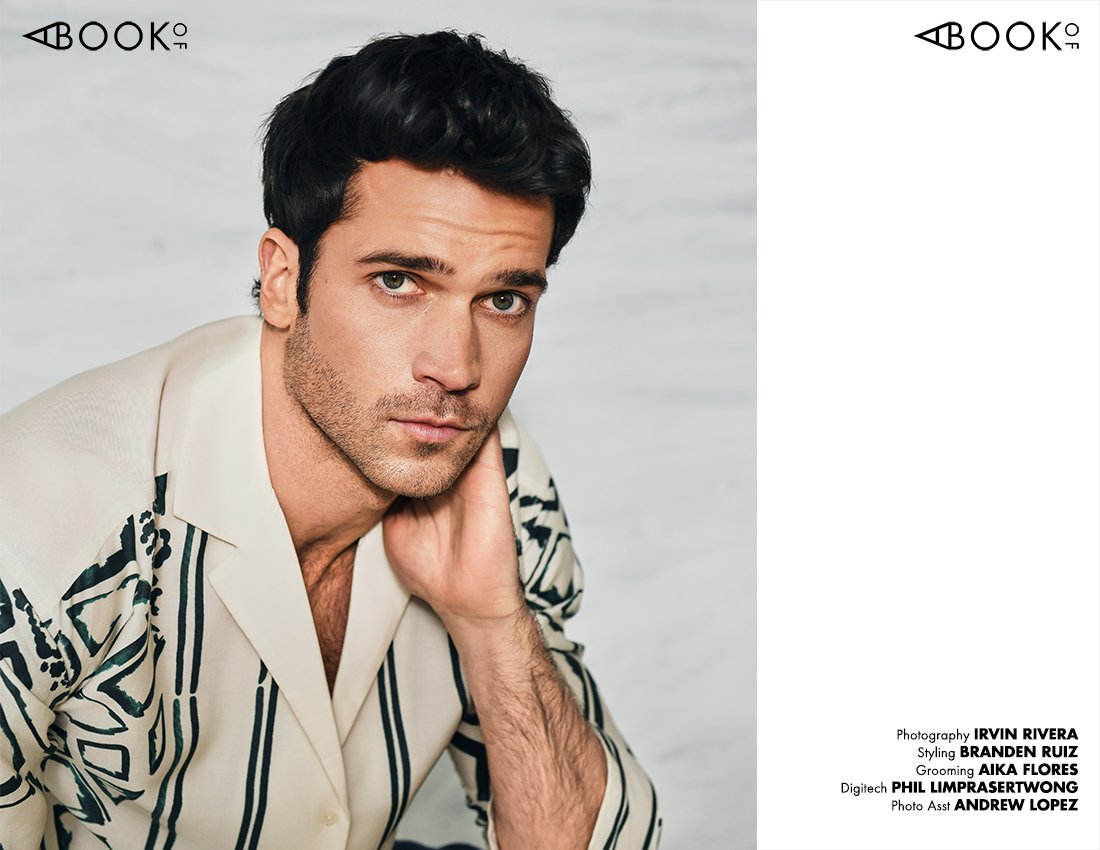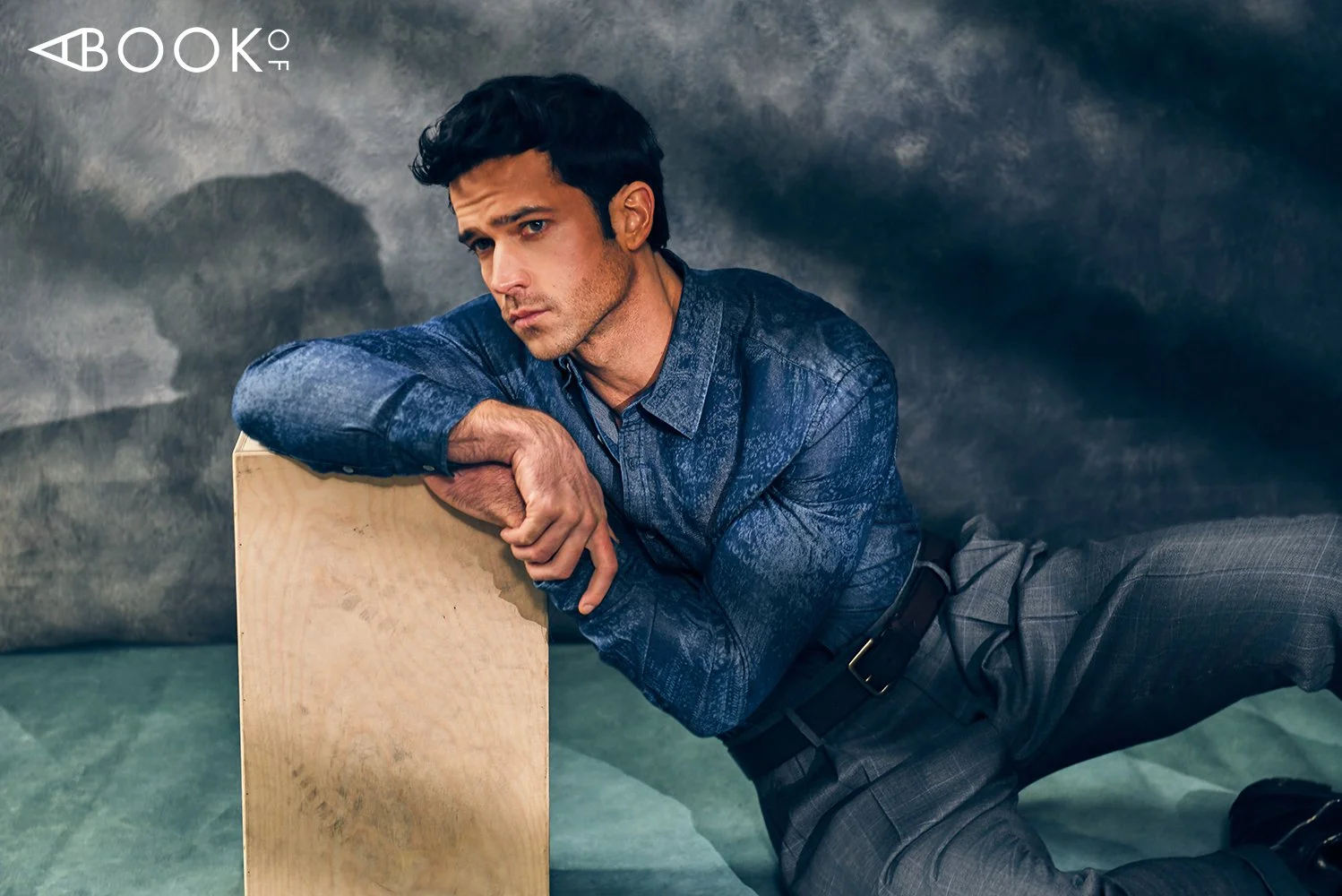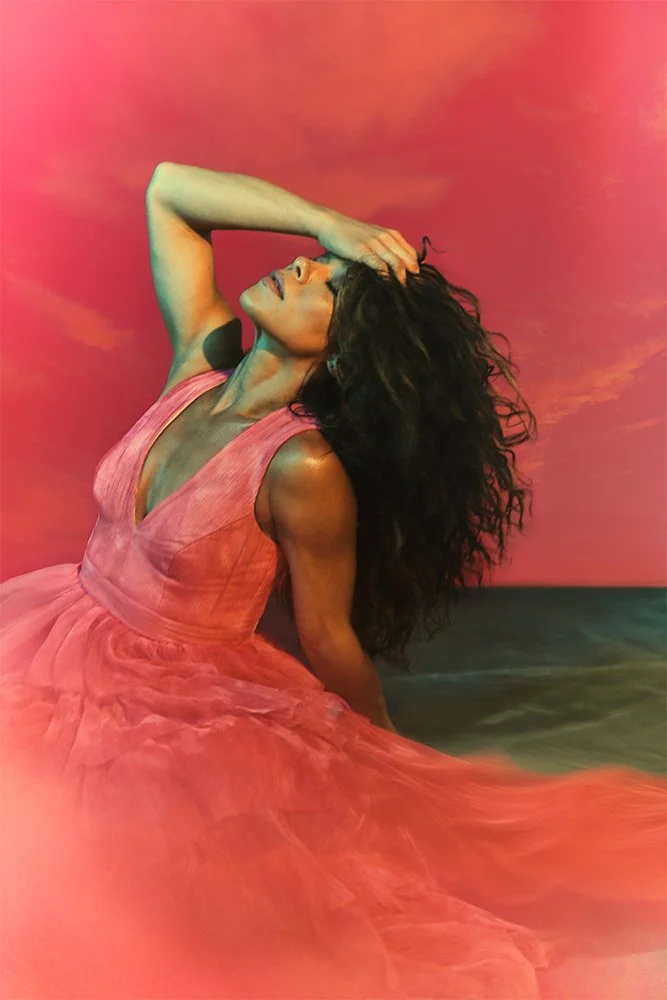HORSES, HOPE, AND HOLDING ON: JACK SCHUMACHER ON REDEMPTION’S RIDE
BY IRVIN RIVERA
PHOTOGRAPHER: IRVIN RIVERA, FASHION STYLING: BRANDEN RUIZ, GROOMING: AIKA FLORES, DIGITECH: PHIL LIMPRASERTWONG PHOTO ASST: ANDREW LOPEZ
JACK SCHUMACHER strides into our studio, just back from the expansive landscapes of “Ransom Canyon,” a sun-soaked Texas drama on Netflix created and produced by April Blair. This series balances small-town romance with classic Western grit. Sharing the screen with notable actors Josh Duhamel, Minka Kelly, and the legendary James Brolin, Schumacher portrays Yancy Fuller, a bull-riding grandson who carries more secrets than spurs. He brings a restless energy that contrasts with the dusty Hill Country.
Off-camera, Schumacher is quick to laugh, but there’s an unmistakable depth in his pauses as he discusses his craft, sobriety, and the script pages he reviews during desert dawns. Spend just five minutes with him, and you can almost smell New Mexico rain in the air, as he shares stories about three-episode shoot days, mirroring Brolin’s gestures, and participating in an intense “cowboy camp” that left callouses mapping his hands.
Schumacher doesn’t preach about redemption; rather, he embodies it, wearing it like a well-loved Stetson, letting others notice the dents for themselves. Just when you think you’ve uncovered every scar on Yancy’s heart, he offers a thought that lingers between us like a lariat mid-loop: “There’s something oddly freeing about accepting that this is simply the road I’m meant to walk.” Saddle up—our in-depth conversation explores the shadows behind the warmth of the campfire glow.
Hi Jack, how are you? What’s keeping you excited and creative recently?
Honestly, I’m having the time of my life right now. The biggest thing keeping me excited has to be the release and incredible reception of Ransom Canyon. Working on the show was such a dream come true, and seeing so many people connect with it has been more than I ever could have hoped for. I’m just so grateful.
Filming in New Mexico presented unique challenges, including shooting multiple episodes simultaneously. How did you maintain continuity in Yancy's character development amid such a schedule?
We definitely had to navigate a really tricky shooting schedule because of the weather. There were days when I’d be filming scenes from three different episodes — and from three very different moments in Yancy’s journey throughout the season. But when you’re surrounded by such talented directors, writers, castmates, crew, and of course our showrunner, April Blair, it becomes so much easier to stay grounded and know exactly where you’re supposed to be in any given moment. That, and I also take extensive notes when I break down scripts with my acting coach, Ivana Chubbuck.
The revelation that Yancy's last name is Fuller adds depth to his backstory. How did this influence your portrayal of his identity and relationships within the series?
Knowing that secret about Yancy’s true identity, I wanted to bring a certain physicality to the role — small, instinctive details that would hint at an unspoken connection. I would watch James Brolin, who plays Cap, my grandfather, and mirror his mannerisms in quiet ways to build a feeling of something shared between them. It gave me so many layers to work with, because Yancy is always carrying hidden truths and trying to hold everything together. That made the emotional work behind the character even more alive for me — the kind of experience that stays with you long after you leave the set.
The show's finale introduces a surprise element with the appearance of Yancy's supposed wife. How did you approach this twist, and what does it reveal about Yancy's character?
I knew about the twist from the moment I booked the role, and I loved it, because it added another secret Yancy had to carry — another quiet weight he couldn’t share. I approached it like I did everything with Yancy: as part of the constant balancing act he’s fighting to maintain, even as his feelings about Ransom, and his connection to people like Ellie, start to shift and grow. It’s another reminder that no matter how much he wants to move forward, there are pieces of his past still holding him back. And as for what it might reveal about him... I’ll just say there’s a lot more story to tell, and I’m really excited for what could be coming next.
Participating in "cowboy camp" was part of your preparation for the role. What skills did you acquire, and how did they enhance your performance as Yancy?
Cowboy camp was incredible — equal parts thrilling and humbling. We trained in horseback riding, cattle sorting, roping both on foot and from horseback, and I had a lot of extra work in bull riding. For me, it was never just about learning the technical skills; it was about making them instinctual, because Yancy would move through that world without even thinking. Being able to ride, rope, or sit on the back of a bull without hesitation made stepping into his boots feel honest. That kind of physical comfort lets you stop “acting” and just live inside the scene.
Yancy's journey is one of redemption and seeking community. How do you interpret his evolution throughout the series, and what message does it convey to the audience?
Yancy’s evolution is really about the realization that what he wants more than anything is a sense of family — a place to truly call home. At first, his motivations are a little misplaced, but as he falls in love with this community, something inside him shifts. He starts to understand that a second chance isn’t something you take by force — it’s something that’s offered when you begin to live differently. His journey is about learning to choose the right path, even when it’s hard. And at the end of the day, I think Yancy’s story is a reminder that redemption is possible, and that sometimes the life you’re searching for is waiting for you if you’re willing to change.
The dynamic between Yancy and Ellie is central to the narrative. How did you and Marianly Tejada develop this on-screen relationship, and what complexities did it present?
Marianly is incredibly talented, and working with her made developing that chemistry feel completely natural. She’s not only gifted but also generous as a scene partner, and that makes what could sometimes be a challenging aspect of acting — finding that connection — feel effortless. When you’re working with someone like Marianly, you can just trust the process and let the relationship develop organically. It gives you the freedom to be fully present, to take risks, and to let the moments unfold without forcing anything. That kind of trust is what really lets the dynamic between Yancy and Ellie come to life.
The series explores themes of family, loyalty, and personal demons. Which themes resonated most with you, and how did they inform your performance?
Facing personal demons, especially my own struggles with addiction, has had the biggest impact on me as an actor. When you’re in active addiction, it’s often a way of trying to numb yourself or escape, and that was very much the case for me. Getting sober forces you to sit with yourself, to ask the hard questions, and to confront the pain at its root That process taught me a lot about human nature, about vulnerability, and about the fight to change. I draw from it when building a character — tapping into that raw honesty to create performances that hopefully feel lived-in, layered, and real.
You've spoken about overcoming addiction and maintaining sobriety. How has this personal journey influenced your approach to acting and the roles you choose?
My journey with sobriety has had everything to do with my approach to acting. One of the many reasons I knew I had to get sober was the realization that if I had any hope of finding success in this industry, I had to clean myself up. I was stuck in a loop of trying to numb myself from the world, and eventually — even though it took me longer than I would’ve liked — I realized that as an actor, I should want access to every emotion, every condition that the human experience has to offer. After many years in sobriety and continuing to work a program to maintain it, the biggest takeaway for me is an overwhelming sense of gratitude. I’m so lucky — so blessed — to be able to participate in this incredibly competitive and difficult industry. Any role, no matter how big or small, is a massive gift, and I never take that lightly.
Reflecting on your career thus far, what have been the most significant lessons learned, and how have they shaped your perspective on the entertainment industry?
I would say that curiosity and an eagerness to learn and grow are traits that are often rewarded. I spent a lot of time dealing with imposter syndrome and the fear that comes along with it, but what I eventually realized is that underneath that fear was too much ego. When I was able to stop trying not to look stupid, stop being afraid of making mistakes, and stop being afraid to ask for help, I was finally able to start growing — not just personally as a man, but also as an actor.
How do you envision your career evolving over the next decade, and what personal goals do you hope to achieve within that timeframe?
I just want to keep improving at this craft. Every audition, every part, every scene I’m lucky enough to be a part of — I just want to keep growing, both as an actor and as a person. I love film and television. I love this industry and the impact it can have on people. Whether it’s a deep, meaningful project that shifts someone’s perspective, or something lighter that simply lets someone sit down and be entertained for a few hours, I want to be a part of bringing that to life.
Having experienced both the highs and lows of life and career, what philosophies or practices keep you grounded and motivated?
As I’ve mentioned before, my sobriety is the most important thing I maintain — it’s what allows me to stay focused on growing and getting better. Fitness is another important part of my daily routine, not just for the physical benefits but for the mental clarity it gives me. As for philosophies, I believe in never quitting and not having a backup plan. I’m committed to pursuing this career for the rest of my life, even if I never book another job. There’s something oddly freeing about that kind of acceptance — knowing that this is simply the road I’m meant to walk.
What advice would you offer aspiring actors navigating their own paths in the industry?
Number one: if you know this is what you want to do, don’t quit. If you’re not in class, get into class — because learning to fail, to take chances, and to fall on your face in a safe environment is one of the best ways to grow. Things really started to open up for me once I embraced that. Ask for help. Take risks. Make your own work. And outside of acting, go live life. Gather new and interesting experiences, because those are the things you ultimately pull from when you perform.
Lastly, if you were a book, what book would you be and why?
I don’t know if I would necessarily be this book, but one of the most meaningful and applicable books I’ve ever read is The War of Art by Steven Pressfield. It speaks so much to the inner battles artists face — the fear, the resistance, the temptation to give up — and how important it is to push through anyway. I can’t recommend it enough.














![RYAN GUZMAN: FUELED BY FIRE [IN PRINT]](https://images.squarespace-cdn.com/content/v1/56c3533a37013b198dcdb996/1728757755981-D1PLKV5HMNR7I9787KP3/RYAN+GUZMAN+A+BOOK+OF+MAGAZINE+PRINT+COVER+web.jpg)




![TOMER CAPONE: PASSIONATE PURSUIT [IN PRINT]](https://images.squarespace-cdn.com/content/v1/56c3533a37013b198dcdb996/1722284693387-DYV7WBS749CHW93YHL10/A+BOOK+OF+TOMER+CAPONE+cover+Web.jpg)
![KAREN FUKUHARA: SILENT STRENGTH [IN PRINT]](https://images.squarespace-cdn.com/content/v1/56c3533a37013b198dcdb996/1721845615346-TVTXWUFM6U0SW38KUGKV/KAREN_FUKUHARA_ABOOKOF_COVER.jpg)

![CHACE CRAWFORD: THE DEEP IMPACT [IN PRINT]](https://images.squarespace-cdn.com/content/v1/56c3533a37013b198dcdb996/1718853333097-26RCKKTFFMKVBKXOJX1D/CHACE+CRAWFORD27805+copy+2.jpg)
![SASHA COLBY: ECHOES OF ALOHA [IN PRINT]](https://images.squarespace-cdn.com/content/v1/56c3533a37013b198dcdb996/1712191464541-T2IFJDZ47QDJPYSWS1RZ/ABO+SASHA+COLBY+WEB+COVER+.jpg)